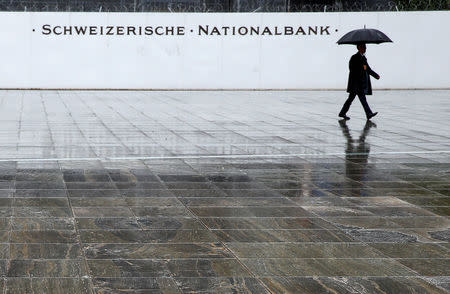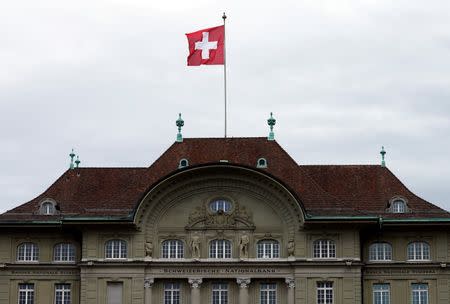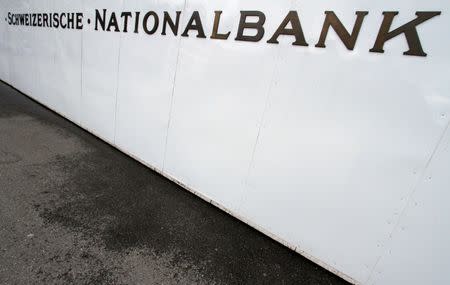Swiss central bank steps up stock buying spree
By John Revill ZURICH (Reuters) - Switzerland's central bank now owns more publicly-traded shares in Facebook than Mark Zuckerberg, part of a mushrooming stock portfolio that is likely to grow yet further. The tech giant's founder and CEO has other ways to control his company: Zuckerberg holds most of his stake in a different class of stock. Nevertheless this example illustrates how the Swiss National Bank has become a multi-billion-dollar equity investor due to its campaign to hold down the Swiss franc. It is now the world's eighth-biggest public investor, data from the Official Monetary and Financial Institutions Forum show. While most analysts think the strategy is sound, this does expose the SNB to stock market risks that the likes of the European Central Bank and U.S. Federal Reserve avoid. "The SNB is in a bit of a corner, they have acquired a lot of foreign currency as part of their efforts to weaken the franc and they have to invest it somewhere," said Alessandro Bee, an economist at UBS. "The bond market is drying up and so they are going increasingly for equities." Switzerland's reputation as a safe haven has long caused problems for the SNB. Investors pile into the franc in times of uncertainty, causing a rise in the currency which hurts Swiss exporters and increases the risk of imported deflation. While the SNB gave up capping the currency's value 18 months ago, it still intervenes on the foreign exchange market from time to time by buying euros with francs it prints, including after Britain voted to leave the European Union in June. Chairman Thomas Jordan has made clear the SNB will stick to its course, which also includes negative interest rates. "We're convinced that given the difficult situation with an overvalued Swiss franc, a negative output gap, and negative inflation, the current approach is the right one - expansion in monetary policy with negative rates and willingness to intervene," he said earlier this month. The result is that its pile of foreign currency reserves - which rose to the equivalent of 635.3 billion francs ($650 billion) at the end of June from 529.5 billion francs a year earlier and 226.7 billion francs in 2010 - is likely to keep growing. The SNB's balance sheet is now proportionately the biggest of any leading central bank. On top of that, its stock portfolio has risen at roughly twice the rate of the overall balance sheet as it diversifies its holdings. In the last 12 months the SNB's equity holdings have surged 41 percent to around 127 billion francs, according to Reuters calculations. Part of this is due to stocks increasing in value despite losses in recent months, as well as new purchases. The SNB has also diversified across stock markets. The United States is its favoured location, with its holdings on Wall Street jumping to nearly $62 billion at the end of June from $38.6 billion a year earlier, according to a Securities and Exchange Commission filing. This includes $741 million in Facebook shares, giving the SNB a 0.28 percent stake, according to Thomson Reuters data. The figure is larger than the 0.17 percent of the firm's publicly-traded stock held by Zuckerberg. The SNB has increased its stakes in all of its top 10 U.S. holdings this year, while many big institutional investors have been reducing much of theirs. For example the SNB's stake in Apple increased by 1.07 million shares in the second quarter, while Invesco sold 9.53 million shares and Fidelity sold 9.23 million in the iPhone maker, according to SEC filings. FRANCS FROM THIN AIR The SNB does not comment on the details of its strategy, but says it does not pick stocks, investing instead in companies according to their weight in various indices. Governing board member Andrea Maechler also said this week that it does not invest in medium-sized and large banks to avoid possible conflicts of interest. It also shuns other stocks for ethical reasons, she told Sonntagsblick newspaper An in-house team manages the investments with help from some outside bankers it does not identify. The SNB is mostly a passive investor, starting only last year to vote by proxy on issues such as executive pay and management structure. While the upward pressure on the franc is unlikely to ease much, this is not the only reason why the stock holdings are likely to continue rising. Alternative markets such as bonds – the traditional favourite investment for central banks - are becoming more risky. This is especially the case in the euro zone where the ECB is buying up debt to stimulate the region's economy, helping to push up prices and turning yields negative on many bonds. The risk for the SNB is that bond prices fall back sharply, should the ECB change its policy. "It's a diversification strategy for them and it is harder to find investment opportunities," said Alexander Koch, head of macroeconomics at Bank Raiffeisen in Zurich. "With the ultra-low interest rates environment currently there is a very high risk that the prices of bonds can fluctuate more than equities." The bank started its share buying spree in 2005 after a change to Switzerland's banking laws allowed it to buy assets other than short-dated bonds. Around 20 percent of the SNB's foreign currency reserves are now in equities, up from 17 percent last year and 10 percent in 2010. "It makes sense for the SNB to do this, and I could imagine them to increase the amount of shares they hold in the future even further," said Koch. "They could even go up to 50 percent of their holdings." The bank's stock portfolio lost 200 million francs in value in the first half of 2016, although it collected 1.7 billion francs in dividends. Nannette Hechler-Fayd'herbe, head of investment strategy at Credit Suisse, said that the risks attached to the SNB's investment portfolio were "absolutely manageable". Diversifying its holdings was more important than any temporary setbacks in global equities, she added. The SNB is not obliged to make a profit under its mandate to ensure price stability and support Swiss economic development. However, it did report a net profit of 21.3 billion francs in the first half of 2016 and its shareholders, including Switzerland's cantons, have grown used to a hefty annual dividend payout. Still, not everyone is happy about the bank's strategy of money printing and buying up stocks including constituents of the U.S. S&P 500 index. "The SNB creates Swiss francs out of thin Alpine air," said James Grant, publisher of Grant's Interest Rate Observer, a U.S. financial markets journal. "Then they go and call their broker and go on a tour of the U.S. stock exchange," he told Finanz und Wirtschaft newspaper. "They get involved in important companies from the S&P which create real profits, and they do that with money which has been created out of nothing." (Additional reporting by Timothy McLaughlin; editing by David Stamp)

 Yahoo Finance
Yahoo Finance 


